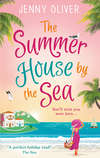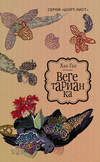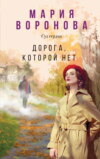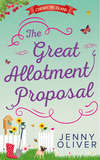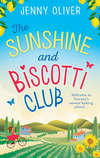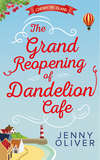Read the book: «The Summerhouse by the Sea: The best selling perfect feel-good summer beach read!»
Praise for Jenny Oliver
‘Brilliantly written, this is packed full of humour and there is a wonderful thread of love… A perfect holiday read.’
– The Sun
‘This book made me want to dance on the beach with a glass of Sangria in my hand. The perfect summer read.’
– Sarah Morgan
‘This is a real treat. A touching story of love, loss and finding out what really matters on life. I love it!’
– Julia Williams
‘Jenny Oliver writes contemporary women’s fiction which leaves you with a warm, fuzzy feeling inside.’
– Books with Bunny
‘Intelligent, delightful and charming! The writing is exquisite.’
– What’s Better Than Books
‘A very uplifting story full of happy endings and guaranteed to make you smile…’
– Goodreads
‘A sprinkling of festivity, a touch of romance and a glorious amount of mouth-watering baking!’
– Rea Book Review
‘…it was everything I enjoy…I couldn’t find a single flaw in the book.’
– Afternoon Bookery
‘I didn’t want to put the book down until I had reached the very last word on the last page.’
– A Spoonful of Happy Endings
JENNY OLIVER wrote her first book on holiday when she was ten years old. Illustrated with cut-out supermodels from her sister’s Vogue, it was an epic, sweeping love story not so loosely based on Dynasty.
Since then Jenny has gone on to get an English degree and a job in publishing that’s taught her what it takes to write a novel (without the help of the supermodels). Nowadays, her inspiration comes from her love of all things vintage, a fascination with other people’s relationships and an unwavering belief in happy ever after!
Follow her on Twitter @JenOliverBooks or take a look at her blog jennyoliverbooks.com.

Copyright

An imprint of HarperCollins Publishers Ltd
1 London Bridge Street
London SE1 9GF
First published in Great Britain by HQ in 2017
Copyright © Jenny Oliver 2017
Jenny Oliver asserts the moral right to be identified as the author of this work.
A catalogue record for this book is available from the British Library.
This novel is entirely a work of fiction. The names, characters and incidents portrayed in it are the work of the author’s imagination. Any resemblance to actual persons, living or dead, events or localities is entirely coincidental.
All rights reserved under International and Pan-American Copyright Conventions. By payment of the required fees, you have been granted the non-exclusive, non-transferable right to access and read the text of this e-book on-screen. No part of this text may be reproduced, transmitted, down-loaded, decompiled, reverse engineered, or stored in or introduced into any information storage and retrieval system, in any form or by any means, whether electronic or mechanical, now known or hereinafter invented, without the express written permission of HarperCollins.
Ebook Edition © May 2017 ISBN: 9780008217969
Version: 2018-07-18
For Waldo and Woody
CONTENTS
Cover
Praise
About the Author
Title Page
Dedication
CHAPTER 1
CHAPTER 2
CHAPTER 3
CHAPTER 4
CHAPTER 5
CHAPTER 6
CHAPTER 7
CHAPTER 8
CHAPTER 9
CHAPTER 10
CHAPTER 11
CHAPTER 12
CHAPTER 13
CHAPTER 14
CHAPTER 15
CHAPTER 16
CHAPTER 17
CHAPTER 18
CHAPTER 19
CHAPTER 20
CHAPTER 21
CHAPTER 22
CHAPTER 23
CHAPTER 24
CHAPTER 25
CHAPTER 26
CHAPTER 27
CHAPTER 28
CHAPTER 29
CHAPTER 30
CHAPTER 31
CHAPTER 32
CHAPTER 33
CHAPTER 34
CHAPTER 35
CHAPTER 36
CHAPTER 37
CHAPTER 38
CHAPTER 39
CHAPTER 40
CHAPTER 41
CHAPTER 42
CHAPTER 43
Extract
Copyright
CHAPTER 1
Ava was standing at the crossing when her phone beeped. She took it from her pocket at the same time as glancing left for traffic.
Instead of looking right, Ava opened the WhatsApp message from her brother, Rory: Gran in hospital, it read. She frowned down at her phone and wondered how Rory could ever think that was enough information. But then the horn of the 281 bus stopped all other conscious thought.
The shriek of the brakes filled the air as she saw the huge windscreen, the wipers. The face of the driver in slow motion, mouth open. Her whole body tensed. She felt her hand drop the phone. Time paused.
There was a fleeting thought that this was actually really embarrassing.
And then – smack – she didn’t think anything else. Just felt the hard pain in her hip, then the thwack of her head as she was thrown down on to the tarmac, and an overriding sense of unfairness because she wasn’t yet ready to die.
CHAPTER 2
The nurse waited patiently as Ava tried once more to get through to her brother.
‘It’s voicemail,’ Ava said, apologetic. ‘Everyone’s on voicemail. No one’s answering their phone, I’ve tried everyone. I’m really sorry.’ All her friends were in meetings or on the tube or at lunch, unreachable.
‘It’s fine.’ The nurse’s nametag read Julie Stork. Ava wondered if using her name might aid familiarity – she found it a bit creepy when the man at Starbucks called her Ava because he’d written it on a cup every day, but she could do with an ally. The alternative was another nurse, Tina, who Julie was talking quietly with now. Tina was terrifying. Her uniform stretched tight over her solid figure, hair scraped back in a ponytail, all-seeing eyes like hungry jackdaws. She’d been the one to inform Ava that she couldn’t go home without someone to watch over her for twenty-four hours, while making it very clear that they needed the bed back as soon as possible.
Without the pressure of having no one to come and get her, Ava might have quite enjoyed her hospital stay. Starched white sheets, lamb chops and green beans, sponge pudding and custard, and a tatty out-of-date copy of OK! magazine. But her eyes hovered distractedly to her phone the whole time, her fingers scrolling through her contacts every few seconds, texting, WhatsApping, refreshing.
She felt her cheeks flush with embarrassment as she heard Nurse Tina mutter, ‘There must be someone.’
So when her phone beeped she pounced on it. A text from Rory: Can’t get away. Jonathon coming to get you.
Ava put her hand over her mouth. How could her brother send her ex-boyfriend, of all people? Send his PA, one of the runners on set, anyone. Not the guy he’d set her up with and who she’d split from three months ago.
She sat up quickly to get dressed and out of the stupid hospital gown that did up at the back, the magazine clattering to the floor. She tried to check her reflection in anything she could find: a knife from her plate. She scrunched her flat hair. She felt dizzy. She paused on the side of the bed and looked up just in time to see Jonathon sauntering up the hospital aisle with a sardonic grin on his face.
‘Hi, Jonathon,’ she said with an embarrassed half-smile as he stopped, hands on hips, at the end of her bed.
‘Hit by a bus, eh?’
She nodded. Tried to stand up but felt faint and sat down again. He swooped round the side of the bed to help her. ‘Thanks,’ she mumbled.
‘It’s fine. Take your time.’
She remembered how familiar his face had been. The wide brown eyes and ruddy cheeks. The frustrated look he’d given her when she’d told him that she didn’t think they were going to work as a couple. That she wasn’t very good at relationships and she didn’t think that she was what he was looking for. That she was good at being on her own. And the wide eyes narrowing as he said, ‘Yes you are. You’re going to have to be. Because honestly, I don’t think I know you at all.’
Now he looked all bright and breezy, the collar of his navy striped rugby shirt turned up, jolly eyes sparkling, while Ava was struggling to stand in her open-backed gown. She shuffled on bare feet to close the curtain, a task which Nurse Tina took over, drawing it with a quick flick of her wrist, hustling the exit process forwards.
‘You need any help?’ Jonathon asked, picking up the magazine from the floor and having a flick through.
Ava shook her head.
Jonathon went to stand outside the cubicle as she picked up her socks. The effort of pulling one on was like clambering over a brick wall. Waves of tiredness made her want to snuggle back down into the pillow. She tried to undo her gown but couldn’t reach the strings at the back. Limbs heavy and useless. She tried again.
In the end she sat, hands either side of her, and shutting her eyes said, ‘Jonathon.’
‘Yep,’ his head poked through the curtain.
‘I think I’m going to need some help.’
She saw the raised brow, the slight quirk of his lips. Then he walked in and carefully undid the back of her gown. She held it to her front as she took out one arm at a time and he handed her her T-shirt. She felt him watching with veiled amusement as she tried to get her top on without exposing any more of her body. But when it came to her skinny jeans she finally had to relent, her toes lost somewhere in the tight denim and the waistband halfway up her thighs. ‘Could you help me pull them up, please?’ she said, cursing Topshop. If she wasn’t so completely shattered the humiliation would have been unbearable.
Finally dressed, Ava had to take a second to sit on the bed and get her breath back. She realised the window behind the bed made the perfect mirror as she saw her flat hair and white face staring back at her.
Jonathon gave her his arm and she took it reluctantly to stand up.
‘You know, this is the most vulnerable I’ve ever seen you,’ he said, chuckling at her obvious displeasure at needing help.
They walked out slowly, Nurse Julie watching with an expression that presumed they were a sweet young couple heading home to eat chicken soup and curl up in front of Homes Under the Hammer. Nurse Tina glanced up from her desk with a satisfied nod and handed Ava a leaflet on concussion and signs to look out for.
Ava just wanted to curl up and sleep, but Jonathon was still talking. ‘That’s pretty crazy, isn’t it? Given we went out for more than six months.’ He paused as he held open the door and added with a grin, ‘I’m still a pretty good catch, you know, Ava . . .’
She managed a smile.
As he bundled her into the soft leather seats of his Volvo, the vulnerable, mildly concussed side of her realised how easy it would be to cosy on down with him in front of some daytime TV. To slip back into the warm, comforting familiarity. But she knew it wasn’t right. Her litmus test was to imagine introducing him to her mother, had she been alive. The three of them sitting down to afternoon tea and her mother’s attention drifting as Jonathon talked politely about his job, his hobbies, his military fitness training. Her mother immediately sizing him up as average. Ava imagined herself cutting in with his achievements, with the fun they had, and her mother with an expression that questioned who she was trying to convince.
Jonathon turned to look at her as he cruised down the main road. ‘I’ll drop you at Rory’s and then head straight off, got to get back to work, OK?’
And Ava realised that the ‘good catch’ statement was just that, a statement, to show her what she’d missed. There was no Homes Under the Hammer option available to her, even if she wanted it. ‘Yes, absolutely fine.’
When they pulled up outside Rory and his wife Claire’s Victorian semi, Jonathon came round to open Ava’s door, but she’d opened it on her own. He shut it after her instead.
‘Got all your stuff?’ he asked, as he followed her to the pavement.
Ava nodded. ‘Thank you. You know, for . . .’ She gestured to her clothes and the car. ‘Everything.’
‘It was my pleasure, Ava,’ Jonathon smirked, leaning in to give her a quick peck on the cheek, then waving to Claire who had just opened the front door. As he slipped back into his heated leather seat, he added, ‘It was actually quite enlightening. Getting to see beneath the . . .’ He made a gesture to her face and body, then coughed and said, ‘Not literally. You know what I mean?’ Then shook his head and with an awkward wave pulled the car door shut.
Ava watched him drive away, the grey sky merging with the road and the pavement. She didn’t have time to dwell on what he’d said because her ten-year-old nephew Max came bounding to her side.
‘Aunty Ava! Where’s your bandage? Mum said you’d been hit by a bus. Wow! That’s so cool. It must have really hurt!’
Claire appeared behind him. ‘Sorry I couldn’t pick you up, I was getting Max from football. You OK?’
Ava rubbed her head, felt the tears of the day pushing behind her eyes. She shook her head. ‘Not really,’ she said.
Claire reached out and put her arms around her, enveloping Ava in the kind of hug mums give on TV adverts, that make everything better and smell of fabric softener and strawberries. Ava was momentarily jealous of little Max standing next to her on the drive, eating chocolate digestives and watching YouTube on a laptop balanced precariously on his arm.
Ava stepped out of the hug, brushing her hair back, wincing as she felt the huge bump on the side of her head. ‘Thanks,’ she said to Claire, who nodded in understanding and ushered her inside, into the bright kitchen diner where she sat down on a battered club chair at the far end, next to the bifold doors that opened out on to the decking and the neatly mown lawn.
‘What do we need to do?’ Claire asked as she put the kettle on. Ava handed her the hospital leaflet, momentarily relieved to pass all responsibility over to someone else. Someone who was just innately caring, practical and kind. Who got a bag of frozen peas out of the freezer, wrapped them in a tea towel and put them carefully on her head, who made her a cup of tea and put sugar in for the shock, and went and found a blanket for her shoulders even though the house was completely warm enough.
Claire ruffled Max’s hair as she walked past him, and once again Ava thought how lucky he was.
Her phone started beeping with replies from her friends, finally out of all-day meetings and finished at the gym, asking if she was OK, whether she needed anything. Ava closed her eyes.
Max plodded over with his laptop and the packet of digestives. ‘Do you think anyone filmed it, Aunty Ava? We should try and find out,’ he said through a mouthful of biscuit crumbs. ‘Because you could send it into Ultimate Fails and they’d put you on YouTube.’
The front door slammed and a man’s voice said, ‘That’s enough, thank you, Max.’
Max rolled his eyes. ‘Hi, Dad,’ he said, perching himself on the armrest of Ava’s chair and disappearing back into his laptop.
Rory strode into the kitchen like a businessman might in a film. Cool and confident, a little distracted, emanating stress. He looked like he always did, just older. Top button on his shirt undone, blond hair a fraction ruffled, sleeves rolled up. He looked at Ava.
She felt like a fool with peas on her head and a blanket round her shoulders.
‘You alright?’ he asked, leaning up against the duck-egg kitchen unit.
She nodded.
‘Nothing broken?’ He poured himself a glass of water.
Ava shook her head.
‘Good,’ he said, downing the drink in one.
She was about to tell him how annoyed she was that he’d sent Jonathon to get her when he asked, ‘Up to travelling?’
Ava narrowed her eyes. ‘Why?’
Rory rolled his lips together, ran his hand through his hair. Glanced at his wife who had paused in the doorway. ‘Not good news, I’m afraid.’
‘What?’ Ava asked. She suddenly remembered the WhatsApp she’d read before the bus hit.
‘She’s died,’ he said, typically matter-of-fact. ‘Gran’s died.’
Ava felt her whole body shrink.
‘All very natural. Peaceful,’ he said, refilling his glass. ‘And they don’t waste any time in Spain. Funeral’s tomorrow.’
Ava sat very still, trying to stop her bottom lip from wobbling, not wanting to cry in front of Rory, hugging the frozen peas absently to her chest. Wishing that today and every other day to come was yesterday.
CHAPTER 3
‘Get off your phone, Rory, this is a wake.’
‘I’m not on my phone. I’m just checking something.’
The room was cool and dark compared to the scorching Spanish heat outside. It smelt of furniture polish, clouds of heady sweet perfume and the waxy candles that burnt bright next to bunches of fake flowers on every surface.
‘That’s being on your phone,’ Ava hissed in a whisper.
‘It’s not. Anyway, they’re all on their phones.’ Rory gestured to the group of men in the corner of the little room where their grandmother’s body was laid out behind a pane of glass, resplendent in all her finery – a shocking turquoise silk kaftan, pink velvet trousers, jewelled sandals, her sparrow-like wrists bedecked with chunky plastic bracelets, and around her neck three or four Bakelite necklaces – an outfit she’d had waiting in the back of the wardrobe for this very occasion.
Ava looked over and sure enough, half of the mourners who’d come to pay their respects were chatting away on their beaten-up old phones. Two men played dominos, while a group of women were knitting as they talked animatedly to the deceased.
‘Just put it away,’ Ava sighed, trying to ignore the remains of yesterday’s headache.
‘You’re very self-righteous for someone who got hit by a bus while on their phone,’ Rory said, as he did another quick refresh of his emails before slipping it in his pocket. ‘What do you think they’re saying to her?’ he added, nodding towards the knitting women nattering away to the body.
Ava shrugged. ‘I have no idea. But whatever it is, it’s very passionate. I’m feeling really British.’ She looked down at her outfit. They were both dressed starkly in black, crumpled from the flight and a hot taxi ride from Barcelona airport. Behind them were men who’d come straight from work in overalls, another in a three-piece white suit, and women in rainbow colours, chatting, wiping their eyes. The crying around them was free and open, but Ava held hers painfully tight in her chest, not quite able to let herself go in front of her dry-eyed brother and all these strangers. ‘I don’t know what I’m going to say.’
Rory shook his head. ‘No, me neither. I’m terrible at this kind of thing. I’m only just getting over the fact that we can see the body.’ He glanced backwards towards the door as if looking for a quick escape.
‘You want to sit?’ One of the knitting women turned, her face as wrinkled as a raisin, a touch of smudged mascara on her grooved cheek that she patted away with a neatly folded handkerchief. Beside her she had a little pug dog, his lame back legs propped up on a harness with wheels.
‘Oh no, it’s fine. Fine. You stay,’ Ava insisted.
Ava and Rory had been hovering awkwardly since they’d arrived. If their father had been there, he’d no doubt have taken charge and said something meaningful about how valuable she had been to them all. But as he was in China, cruising the Yangtze River, he wasn’t there to take charge.
‘I have said enough,’ the woman replied, standing so that Ava could take her place and ushering the women next to her to do the same. The candles all around them flickered.
Rory nudged Ava forwards. ‘I’m not really sure what to say,’ she laughed nervously as she felt the eyes in the room watching.
‘Say whatever you like.’ The woman raised her hands as if to encompass the world. ‘You are here to keep her company.’
‘To remind her of how greatly she was loved,’ another woman with bright dyed-red hair added as she went past. ‘Although we all know how much she liked a bit of gossip.’
Ava and Rory took the seats, staring at the figure laid out in front of them, her rouged cheeks and pink lipstick, her costume jewellery glistening in the dull spotlights, her beads, her velvet, her tiny shiny shoes.
Ava looked at Rory.
‘We flew out Ryanair, Gran,’ he said. ‘You’d have hated it. No leg room.’ Then he made a face like he didn’t know what else to say and beckoned for Ava to continue.
Ava swallowed. ‘You look amazing, really great outfit,’ she said. It felt as though the whole room was listening, so she stood up to talk a little quieter, her mouth close up to the glass, eyes staring at the fabric of her grandmother’s kaftan. ‘It feels like we haven’t been out here for ages. I’m sorry about that. I wish I’d seen you.’
Not knowing what else to say she glanced down at the floor, at her black shoes. ‘I’ve worn really boring shoes,’ she added, looking back up, this time at the face she knew so well, now lifeless and powdery. ‘Oh God,’ she put her hand to her mouth, ‘I’m going to really miss you.’ Her voice caught. ‘I’m sorry. Everyone’s watching me.’ She closed her eyes, stared into the darkness of her eyelids and said, ‘I suppose I just want to say thank you.’ She opened her eyes. ‘Thank you, for everything. I feel like you’re going to ring me and tell me that this all went really well.’ She half-laughed, then stopped, because as she stood there her eyes suddenly saw her own reflection in the glass rather than what was behind it. The black of her dress made her body disappear and she saw her face overlaid on to her grandmother’s. Her bobbed brown hair over shocking white curls, open blue eyes overlaid on closed tanned eyelids shaded with a stripe of bright hot pink.
At the same time a group of people bustled in through the door, as more of her grandmother’s friends arrived together, all wild gesticulations and a tumble of easy words, clutching tissues and holding hands. The space around them thronged. Rory stood up, their chairs now odd little empty islands as the number of people standing amassed.
A man in a slick black suit walked to the front and started to sing. Ava’s breath caught in her throat as the sound of this lone deep voice echoed around the room.
She stared at her face merging with her gran’s. With Valentina Brown – Val – her wonderful, opinionated, feisty grandmother, aged eighty-four, her outfit and her funeral preparations ready, her life lived like a peach so ripe it was ready to burst. Died at the same moment as Ava had lived. Like a deal had been struck with the universe to save her.
Ava could almost hear her voice. ‘You stupid girl. Me, I’m ready. You. You are not ready. You have more to give than this! You could have anything you like. Babies, husbands. I know, I know, I’m old-fashioned. Anything, Ava. Life is precious and time is not your friend. This is fate. Don’t sigh. I can hear a sigh down the phone. No respect – just like your mother. Just think for a moment, if this was it, Ava, would you be happy with what you’ve achieved?’
Ava stared transfixed at the glass. Was her life something to be proud of? Had it really been lived as well as it could? If someone had stood at the lectern to speak, what would they have said about her?
Then, just as the haunting song was reaching its peak, Rory’s phone started to ring.
‘Oh man.’ Ava rolled her eyes.
‘Sorry!’ Rory held up his hand. ‘Sorry,’ he said, as he fumbled to turn it off.
Then the coffin lid shut. Ava blinked. The curtain drew around the glass and the reflection popped.
‘Are you alright?’ Rory nudged her on the arm.
‘Yes.’ Ava tucked her hair behind her ears. They followed as everyone in the room headed towards the door.
‘Sure?’ He narrowed his gaze.
She nodded, sliding her sunglasses down as they stepped out into the dazzling bright sunshine of the little Spanish town, a place familiar from holidays – a fifteen-minute drive from their grandmother’s beachside house – visited for the supermarket, the nightclub and a day trip whenever it rained.
The mass of people spewed out into the road, the noise in the air like starlings. And when the procession began it was like burying royalty. People came out of shops to nod their heads, stood in the doorways of the little tapas bars, leaned against the gnarled trunks of the orange trees to watch. The air was perfumed with the hint of late blossom and exhaust smoke, while the sun baked them all like an oven.
There was a band made up of three old guys with a trumpet, an accordion and a tambourine, led by the singer from the wake. The music and the chatting followed the coffin all the way to the cemetery, loud and lively, the wobbling mass of people like jelly through the streets.
All exactly to Valentina Brown’s specifications.
Ava allowed herself a moment of morbid self-absorption to imagine, had it been her, the rainy, grey afternoon, people shaking out their umbrellas and wrapping their black macs tight, complaining about the terrible summer they were having, her father standing quietly in the front pew while Rory gave the eulogy. She glanced at him surreptitiously checking his emails. Great.
At the cemetery the sun flickered through giant fir trees, welcome shade as the group paused in front of a big white wall of little black doors. Behind these niches were the coffins of the people in the gilt-framed, sun-bleached photographs screwed above each door. Faded artificial flowers and alabaster Virgin Marys watched mournfully over the proceedings as rays of sun dappled like fingers of dusty light.
Words were said in Spanish, a blessing Ava couldn’t understand. So she remembered instead her first taste of chorizo and chickpeas, and the sound of Padrón peppers sizzling in the pan, so incongruous in the little Ealing bungalow where her grandparents lived, the crazy-paved outside wall and the gnomes in the garden. Remembered the piping hot doughnutty churros and the pots of warm melted chocolate for breakfast that they ate in their sleeping bags in the front room on swirly brown carpet in front of the two-bar electric fire. And then summer holiday trips in the car, driving endless miles through France and across Spain to Mariposa, the beach town where Valentina Brown grew up. Home of the Summerhouse. Once a ramshackle fisherman’s hut – a place where their great-grandfather hauled his boats to store them for the winter and mend his nets – transformed into a little haven on the cusp of the sea by Eric Brown, Val’s husband, his pale English skin and dislike of sand keeping him happily indoors with his Black & Decker and PG Tips. Summer after summer the roof was tiled, the walls plastered, the bathroom and kitchen refitted, a little terrace added and a first-floor bedroom built into the wooden-beamed eaves. Ava remembered standing in the shade of the palm trees, handing her grandfather nails and spirit levels, while Rory mixed thick cement with a trowel and they both got told off for flicking each other with white paint. And as Eric carefully laid the pebbles for the front path, Ava wrote the words ‘Summerhouse’ in shells and a great discussion ensued as to whether there should have been a space between the words, Rory rolling his eyes at her stupidity and Val appearing to clip him round the ear before bending down and writing ‘Our’ in shells in the wet cement above.
It was the perfect summer hideaway. And when Eric passed away, Val decamped from Ealing to Mariposa full-time, and the Summerhouse became her everyday house. But for Ava and Rory it was still the place that holidays were made of.
‘She had a bloody good innings,’ Rory whispered as Val’s coffin was lifted.
Ava turned to look at him, snapped out of her memories. ‘It’s not a cricket match, Rory.’
He snorted under his breath. Ava looked away, out across the sea of mourners, to the hats and the white hair, the smiles, the open tears, the handkerchiefs, the cigarettes, the hipflasks, the veils and the bright pops of corsage colour.
She saw the fullness of a life take shape in the people come to mourn it and was struck by the single thought: I have been given a second chance.
She turned back to see the coffin carried towards its final resting place, waves of sunlight dancing on the carved wood while glitter-edged artificial flowers shone pink around the niche in the wall like a welcoming cocoon. And as the coffin slid inside the chamber, Ava reached up to wipe the first tear from her cheek.
